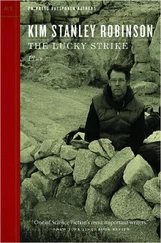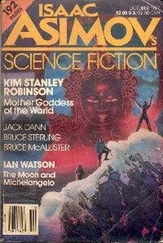“Yes, we are ready.”
“Okay, well, shit. Just hold put there. It’ll take a while to beat back up to you in this wind.”
“That’s all right. We have our warm clothes on, and a ground pad. We will wait for you.”
“As if you have any choice!” Roger says, and puts the handset down.
He starts sailing in earnest. First he turns across the wind, then tacks up into it, and the boat suddenly shrieks like a banshee. The sail-mast is cupped tight. Roger shakes his head, impressed. You would have to shout to be heard over the wind now, but no one is saying anything; they’re letting Roger concentrate on the sailing. The whiteness they are flying through is lit the same everywhere, they see nothing but the ice right under the cockpit, flying by. It is not the purest whiteout Eileen has ever been in, because of the wind and the ice under the lee rail, but it is pretty close; and after a while even the ends of the iceboat, even the ice under the lee rail, disappear into the cloud. They fly, vibrating with their flight, through a roaring white void; a strange kinetic experience, and Eileen finds herself trying to open her eyes farther, as if there might be another kind of sight inside her, waiting for moments like this to come into play.
Nothing doing. They are in a moving whiteout, that’s all there is to it. Roger doesn’t look pleased. He’s staring down at their radar, and the rest of the instrumentation. In the old days pressure ridges would have made this kind of blind sailing very dangerous. Now there is nothing out there to run into.
Suddenly they are shoved forward, the roar gets louder, there is darkness below them. They are skating over a sandy patch. Then out of it and off again, shooting through bright whiteness. “Coming about,” Roger says.
Eileen braces herself for the impact of their first tack, but then Roger says, “I’m going to wear about, folks.” He brings the tiller in toward his knees and they career off downwind, turn, turn, then catch the wind on their opposite beam, the boat’s hull tipping alarmingly to the other side. Booms below as the ballast weight shifts up to the windward rail, and then they are howling as before, but on the opposite tack. The whole operation has been felt and heard rather than seen; Roger even has his eyes closed for a while. Then a moment of relative calm, until the next wearing about. A backward loop at the end of each tack.
Roger points at the radar screen. “There they are, see?”
Arthur peers at the screen. “Sitting down I take it.”
Roger shakes his head. “They’re still mostly over the horizon. That’s their heads.”
“You hope.”
Roger is looking at the APS screen and frowning. He wears away again. “We’ll have to come up on them slow. The radar only sees to the horizon, and even standing up it won’t catch them farther than six k away, and we’re going about a hundred fifty k an hour. So we’ll have to do it by our APS positions.”
Arthur whistles. Satellite navigation, to make a rendezvous in a whiteout. . . . “You could always,” Arthur begins, then claps his hand over his mouth.
Roger grins at him. “It should be doable.”
For a nonsailor like Eileen, it is a bit hard to believe. In fact all the blind vibration and rocking side to side have her feeling a bit dizzy, and Hans and Stephan and Frances look positively queasy. All five of them regard Roger, who looks at the APS screen and shifts the tiller minutely, then all of a sudden draws it in to his knees again. On the radar screen Freya and Jean-Claude appear as two glowing green columns. “Hey you guys,” Roger says into the radio handset, “I’m closing on you, I’ll come up from downwind, wave your arms and keep an eye out, I’ll try to come up on your left side as slow as I can.”
He pulls the tiller gently back and forth, watching the screens intently. They come so far up into the wind that the sail-mast spreads into a very taut French curve, and they lose way. Roger glances ahead of the boat, but still nothing there, just the pure white void, and he squints unhappily and tugs the tiller another centimeter closer to him. The sail is feathering now and has lost almost all its curve; it feels to Eileen as if they are barely making headway, and will soon stall and be thrown backward; and still no sign of them.
Then there they are just off the port bow, two angels floating through whiteness toward the still boat—or so for one illusory moment it appears. They leap over the rail onto the foredeck, and Roger uses the last momentum of the iceboat to wear away again, and in a matter of seconds they are flying east with the wind again, the howl greatly reduced.
By that sunset they are merely in a light mist. Next morning it is gone entirely, and the world has returned. The iceboat lies moored in the long shadow of Olympus Mons, hulking over the horizon to the east. A continent of a mountain, stretching as far as they can see to north and south; another world, another life.
They sail in toward the eastern shore of the Amazonian Sea, famous before the crash for its wild coastline. Now it shoots up from the ice white and bare, like a winter fairy tale: Gordii Waterfall, which fell a vertical kilometer off the coastal plateau directly into the sea, is now a great pillared icefall, with a great pile of ice shatter at its foot.
Past this landmark they skate into Lycus Sulci Bay, south of Acheron, where the land rises less precipitously, gentle hills above low sea bluffs, looking down on the ice bay. In the bay they slowly tack against the morning offshore breeze, until they come to rest against a floating dock, now somewhat askew in the press of ice, just off a beach. Roger ties off on this, and they gear up for a hike on the land. Freya and Jean-Claude carry their backpacks with them.
Out of the boat and onto the ice. Scritch-scritch over the ice to shore, everything strangely still; then across the frosty beach, and up a trail that leads to the top of the bluff. After that a gentler trail up the vast tilt of the coastal plateau. Here the trailmakers have laid flagstones that run sometimes ten in a row before the next low step up. In steeper sections it becomes more like a staircase, a great endless staircase, each flag fitted perfectly under the next one. Even rime-crusted as it is, Eileen finds the lapidary work extraordinarily beautiful. The quartzite flags are placed as tightly as Orkney drywall, and their surfaces are a mix of pale yellow and red, silver and gold, all in differing proportions for each flag, and alternating by dominant color as they rise. In short, a work of art.
Eileen follows the trail looking down at these flagstones, up and up, and up, up some more. Above them the rising slope is white to the distant high horizon, beyond which black Olympus bulks like a massive world of its own.
The sun emerges over the volcano. Light blazes on the snow. As they hike farther up the quartzite trail it enters a forest. Or rather, the skeleton of a forest. Eileen hurries to catch up with Roger, feeling oppressed, even frightened. Freya and Jean-Claude are up ahead, their other companions far behind.
Roger leads her off the trail, through the trees. They are all dead. It was a forest of foxtail pine and bristlecone pine; but the tree line has fallen to sea level at this latitude, and all the big old gnarled trees have perished. After that a sandstorm, or a series of sandstorms, have sandblasted away all the trees’ needles, the small branches, and the bark itself, leaving behind only the bleached tree trunks and the biggest lower branches, twisting up like broken arms from writhing bodies. Wind has polished the spiraling grain of the trunks until it gleams in the morning light. Ice packs the cracks into the heartwood.
The trees are well spaced, and they stroll between them, regarding some more closely, then moving on. Scattered here and there are little frozen ponds and tarns. It seems to Eileen like a great sculpture garden or workshop, in which some mighty Rodin has left scattered a thousand trials at a single idea, all beautiful, altogether forming a park of surreal majesty. And yet awful too; she feels it as a kind of stabbing pain in the chest; this is a cemetery. Dead trees flayed by the sandy wind; dead Mars, their hopes flensed by the cold. Red Mars, Mars the god of war, taking back its land with a frigid boreal blast. The sun glares off the icy ground, smeary light glazing the world. The bare wood glows orange.
Читать дальше
Конец ознакомительного отрывка
Купить книгу












